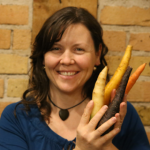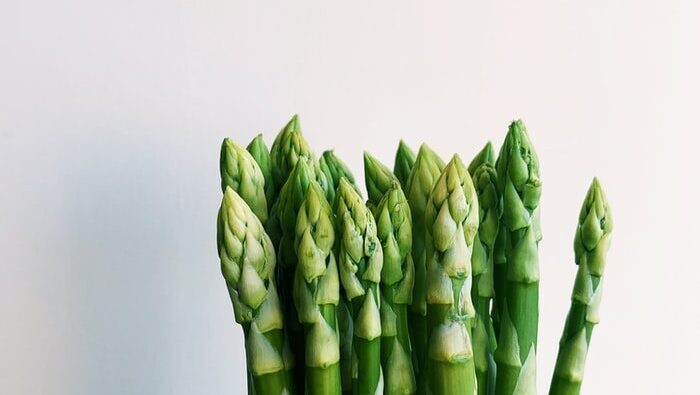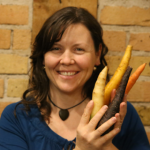6 min read
Written by Amy Bumbacco, Contributing Blog Editor

Jenn Pfenning is a champion of local, organic food production and the rights of migrant workers. You might know her from Pfenning’s Organic Vegetables where she is the Director of Human Resources and Local Purchasing, or from her extensive background of volunteer work with the National Farmers Union, Organic Council of Ontario, and FoodShare Toronto. She was also just voted into the well-deserved and well-suited position of Ward 4 Township Councillor in Wilmot.
I wanted to share a bit about Jenn including her passion for her community, her work with local food systems, and her advice for seeking justice for migrant workers. Jenn graciously agree to an interview, and here’s what she had to say.
What do you love most about Wilmot Township?
Wilmot Township is a beautiful, caring community that proves its heart by stepping up when someone needs support. There are many reasons to love living here, such as the great restaurants, independent shops and beautiful countryside. But it’s the people that make it truly special. That’s not to say that we have no conflicts or times when people don’t do the best they could. We are all fallible humans after all. When the chips are down, there’s nowhere I would rather be because there are a whole lot of incredible souls that reach out to help lift you up. When the times are good and life is wonderful, we have community events, festivals and celebrations nearly every weekend!
Having raised my children here, I can say it is a good place to raise a family. My sons learned the value of community and I had the peace of mind to know that there were always people around who would give them a hand if I wasn’t there. What a blessing that is!
As a new Township Councillor, how will you give back to your community?
I put my name forward to offer my service to this community that has my heart so that I can use the skills and energy I have, to build on what we have and contribute to making it even better. I am looking forward to bringing new ideas and engaging my creativity to the job of representing our township.
There are several areas that interest me, and I think the biggest challenge will be deciding what to engage in first. Top of my personal list is public spaces. From trails and parks to recreational and functional spaces for conferences, we have a lot of potential.
It makes sense on every level to invest in these things. As we know, the single biggest determinant of health and longevity is a sense of community and connection. Active and healthy lifestyles improve mental health and create opportunities for people to interact with each other in the community where they live. Lifelong learning is a key to mental health as we age. Ensuring that we have spaces and programming that makes such opportunities available and accessible makes our community a healthy place to live at every age.
Tell me about the ‘Pfenning Pfarm Pfamily’.
My Pfenning Pfarm Pfamily is the best! They share the work of bringing healthy food to the people of this community and beyond, while supporting and loving each other and being the most dedicated, awesome group of people anyone could ever ask for. We all come from different backgrounds, speak different languages and practice different belief systems and cultural norms. In spite of that, we respect and support each other. Sometimes we don’t see things the same way, but we are all passionately committed to the same goals. I am grateful for each person.
What challenges do migrant workers face?
I could write tonnes on this question! People come to work in this country because they don’t have enough economic opportunities in their home country. As a fellow activist from Mexico put it, these are not people who are travelling to see a new and interesting place. They are travelling to seek opportunities denied them in their home countries. The global politics of power and inequality have created economic situations in their countries that force them to leave their homes, families and communities to enable their families to survive. This is not a choice.
Choice is a word to describe the weighing of two or more options of equal value. Deciding between staying in their communities with their families and having no money to send their kids to school versus leaving them to spend most of the year or even several years at a stretch in a foreign country is not a CHOICE. It is forced migration. Immigrating to another country with the whole family to escape persecution or economic hardship is not a CHOICE. It too is forced migration. Or flight as a refugee. Then the workers who come face challenges to their mental health as they may be isolated on a remote farm or other work situation, have few people who speak their language and often face racial, socio-economic or cultural discrimination.
How can we seek justice for migrant workers?
This does not mean we should stop allowing them to come. Rather, we must start by recognising the realities of their decision and the fact that they contribute very vitally to our own country. If we begin with that idea, from a place of respect, we can dismantle the inherent racism in the system we have now and build a new system that will reduce the challenges. It will not eliminate the problems on a global scale, but it is a start.
From a grassroots perspective, we can actively advocate for better regulations by writing to our MPs, sharing social media and engaging in constructive dialogue when racist and discriminatory attitudes surface. Speaking truth and enlightening people respectfully will turn the tide. Even if it is slow, it is important.
We can also connect with organisations that represent workers to learn how to be an ally. Justice 4 Migrant Workers, InterPares, La Via Campesina Migration Collective are some really good ones.
What is your favourite part about working with local food and farming?
Working in farming and producing food is the most rewarding thing I can imagine doing with my life. We all need to eat. There are a lot of ways to meet the caloric intake requirements we have, but being able to provide the community around me and wider communities with delicious healthy foods literally makes me giddy with joy. What other job would give me a sense of connection with nature, the ability to serve people and access to lots of great food for my family?
Don’t get me wrong, it’s not a constant laugh-riot. It is challenging and gut wrenching too. When a 30 second hail storm wipes out a field of lettuce that was hours away from harvest, or drought and heat kills the delicate first shoots of carrots germinating in the field, it feels like someone gut-punched you with a sledgehammer. But when the crop is ripe, we harvest it and it makes its way onto my table and tables around the province, it feeds all of us.
One of my favourite things is when I meet a person and they recognise the name that is on the bag of carrots, bunch of kale, head of cauliflower or some other vegetable that they love and they say, “I love your [Insert veg name here]!” Their faces light up with the remembered pleasure of eating that lovingly tended vegetable and they share their joy back with me and everyone around. That makes it all worth it.

